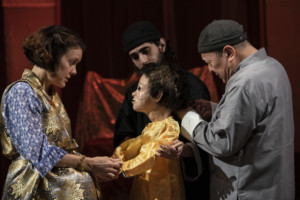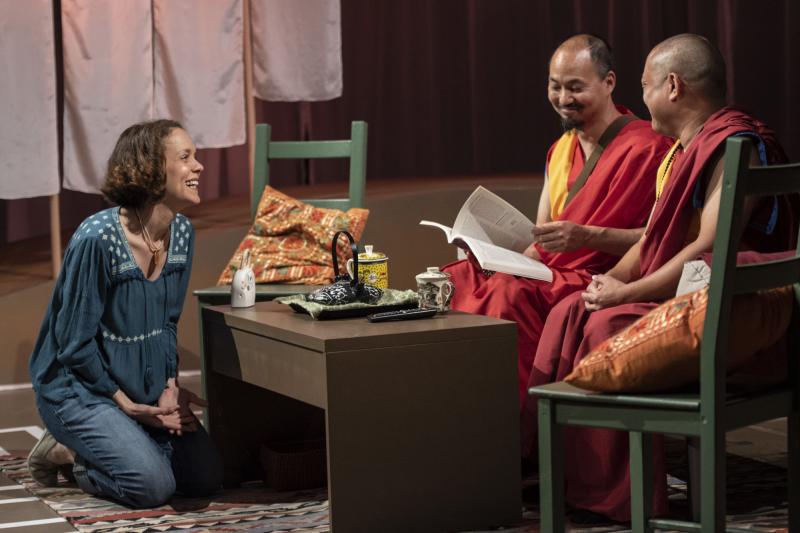Review: THE OLDEST BOY at Spooky Action Theater

The central performance in Sarah Ruhl's The Oldest Boy, now playing at Spooky Action Theater through June 30, belongs to the ensemble as a whole. The title character, a reincarnated Tibetan Buddhist lama, is brought to life not by a single actor, but by the seven actors that create his world. Some are more directly responsible than others - the puppeteers, for example, move him from one place to another, help him to look where he needs to, help him to hold things - but all are crucial to helping us believe in him. When his mother looks into his eyes, we think we can catch him breathing. It's a leap of faith on our part, one that yields some of the richest results any show will bring this summer.
Jenna Sokolowski, the unnamed American mother of the reincarnated Lama - named Tenzin - brings a bewildered tenderness to the show that is evocative of Ruhl's best heroines. She and her husband (Rafael Untalan), a Tibetan man who married her against his own tradition, find out early that their son might be more important than they realize when another lama played by Steve Lee visits. He was previously the student of the now-reincarnated lama, and, believing Tenzin to be his teacher - something swiftly and smartly proved to be true - wants Tenzin's parents to bring him to India for a life of spiritual training. And Tenzin wants to go.
Like so many of Ruhl's plays, this is a play about parenting - specifically motherhood - and Sokolowski's character reacts about how you would expect. Much of the play's action is about her coming to grips with her son's truth - she never says no - and it's less of an inner struggle than it is a slow, sad and beautiful realization of one of the hardest things for anybody to learn: we can't tell people we love who they are, a sentiment Sokolowski carries in her body and voice with her every second onstage. Rafael Untalan is beautiful as her husband, a man who has made countless sacrifices for the people he loves, and is ready to make one more for his son's sake. Simply the way Untalan delivers a line like "it's slippery" (in a moment I wouldn't dare spoil) is enough to seize the coldest heart.
Lee's lama, and his student played by Franklin Dam, are deeply understanding of the situation they've put this family in, and don't press the issue. Instead, they focus their attention on Tenzin. Their scenes with the Oldest Boy - operated by dancer/puppeteers Matthew Marcus and Stefany Pesta, both remarkable to watch - are both familiar and new as they get to know Tenzin's new life and perform gentle tests to see how much he remembers. Lee - this being his first time back onstage in six years - is quietly affecting, especially in his scenes with Sokolowski, and Dam carries an ever-present enthusiasm that counters very nicely with Lee.

But it all comes back to the Oldest Boy. In addition to the work of the puppeteers and his supporting cast (who also make some slight adjustments in the puppet's movements), Al Twanmo provides his voice. He is marvelous, his voice carrying the weight of age and experience and the playfulness and curiosity of a child in all his scenes. The puppet design is by Matthew Pauli, and the Oldest Boy he has created is expressive, flexible and - most crucially - believed in by everyone onstage. It would be a mistake to say the effect is not a little jarring at first, but the tender pace of the show - and the smooth, unceremonious way we're introduced to the puppet - make it feel simply normal.
As an audience, it's our job to adjust our realities to a performance, and the artists' to help us make that commitment. Director Kathryn Chase Bryer and her team of designers lean in to the simple magic act of believing. The simple yet elaborate set design by Vicki R. Davis, the soft tones of David Crandall's score, Elizabeth Long's spare props (including seven bowls of water that contribute to one of the most striking moving images in the show), Max Doolittle's lights and Julie Cray Leong's costumes - all of these meet with Bryer's deliberate direction in a perfect union. This show runs an hour 45 with one intermission, and they have perfectly captured the spirit of a Sarah Ruhl show. Ruhl's most memorable stage direction is in Eurydice: "It takes time to build a room out of string." That philosophy is on display in The Oldest Boy; the second half of the play takes place in India, and the set receives a total redesign. They could easily have made this transformation during intermission; instead, it opens the second act and we watch it happen, and we and the show are the better for it.
The Oldest Boy is about many things, but days later what I think about most is its relationship to time: how we're suddenly shot back to the night the mother and father met; the moment the lama knows for sure Tenzin is his teacher; the time it takes to give a puppet a haircut onstage. Time isn't something we can manipulate. Acceptance takes time; forgiveness takes time; all necessary actions take time. And there's limited time for you to get your tickets for The Oldest Boy, something you can do right here. It closes June 30; please don't miss it.
Reader Reviews

Videos
